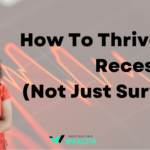More than 50% of all my investable dollars are in real estate.This asset class has created more millionaires than any other in human history.
Yet, real estate is still considered an “alternate” investment, since mainstream media and Wall Street dominate our attention with the stock market. In the previous several thousand years of recorded human history, you’d need to have a chunk of capital to get involved with real estate investments.
But today, with the recent changes in law and technological advancements, you can now get involved in the game for as little as $50. Now, it’s going to take you a long time to build wealth investing $50 at a time, but if that’s where you’re at, embrace it.
You can add real estate to your portfolio through a relatively new approach called real estate crowdfunding.
In this article, I’ll walk you through what real estate crowdfunding is, how it works, and specific action steps you can take to start investing immediately. We’ll also look at some background on why real estate has produced so much wealth consistently for so many.

Table of Contents
What is real estate crowdfunding?
Crowdfunding is defined as “the practice of funding a project or venture by raising many small amounts of money from a large number of people, typically through the Internet.”
Crowdfunding is most commonly used by startup businesses trying to raise capital to expand and access alternative funds.
This way, it doesn’t burden any singular entity, either with the responsibility of dishing out the funds or with taking up the risk of loss.
I’m going to repeat my story here. Back when I was in college, having hustled with a network marketing business all the way through school, I was able to bank $50,000.
Not knowing of any other options, I put all the money in the stock market, and the dot com bubble burst of 2000 saw half my money evaporate. 50% of my hard-earned cash, gone.
That’s when I learned that I can’t play around much with my hard-fought principal capital. I mean, saving up $100,000 is really fucking hard to do.
You’ve got to get that into much safer, less volatile asset classes and get it kicking off cash flow. If I could rewind, and knowing what I know now, I would have put a huge chunk of that into real estate crowdfunding had it been available.
How real estate crowdfunding works
Crowdfunding happens in many other ways besides for startup businesses or real estate investing.
Many individuals affected by a natural disaster, hefty medical expenses, or another tragic event such as a house fire have received an amount of financial relief they wouldn’t otherwise have had access to, thanks to crowdfunding platforms. We have made many donations to people in need through gofundme, as I’m sure you have as well.
However, in recent years, some crowdfunding platforms such as Patreon and Substack have extended the reach of crowdfunding to offer a way for creative people — artists, writers, musicians, or podcasters — to sustain their creative work by receiving a steady source of income.
Shit, now that I write this, I ought to list a GoFundMe link right here for my podcast. It hasn’t made squat in 100 episodes. : )

Real estate crowdfunding returns
Real estate crowdfunding provides investors with the potential for significant returns on their investments. While there is no guarantee of any particular return, experienced real estate investors can expect to see average returns of around 10-12%. This return rate is significantly higher than traditional investments like stocks and bonds, making it an attractive option for many individuals looking to diversify their portfolios or get into the real estate market. Additionally, some platforms offer returns as high as 24% to their investors, making it an even more appealing investment opportunity for those with higher risk appetites. With careful cash management and a bit of research, real estate crowdfunding can be a lucrative addition to any investor’s portfolio.

The best real estate crowdfunding platform
There are several real estate crowdfunding platforms out there, including CrowdStreet, Realty Mogul, and Fundrise.
CrowdStreet was rated the best overall, but it’s also limited to Accredited investors only, which means you have a million or make over $200k per year the past two years.
For our purposes, we’ll focus on Fundrise as it’s rated as the best crowdfunding platform for beginners from independent reviews.
And I have to agree, from my research, it’s pretty solid.
Fundrise is a Washington, D.C.-based financial technology company founded in 2012 that operates an online investment platform. It is the first company to successfully crowdfund investment into the real estate market.
Since its launch, Fundrise has invested in more than $5 billion worth of real estate across the U.S. Today, it manages over $1.5 billion of equity on behalf of more than 170,000 individual investors.
Phew, what a game changer!
What opened up more opportunities for everyday investors within Fundrise offerings was a change in law called the JOBS Act – Jumpstart Our Business Startups. This was when the first law of Regulation A came into effect.
This was the first time that regular investors, not just wealthy high-earning accredited investors, were able to invest in private offerings, like private companies and private real estate deals, that were traditionally off limits.
The JOBS act not only lifted the lid for real estate, but also opened up access to a whole suite of private companies that can produce life-changing wealth for early stage investors. I cover this in podcast #23: “How To Move The Needle On Your Wealth With Pre-IPOs”.
Fundrise offers five account levels: Starter, Basic, Core, Advanced, and Premium. There’s a minimum investment amount at each level and varying investment strategies and potential returns. You’ll have 2 forms of income you can generate:
- The cash flow from rent payments from tenants, which are distributed on a quarterly basis. Since 2012, Fundrise investors have received 194M in dividends.
- The increase in underlying value of the property, even while that property is generating dividends. You’ll realize the appreciation returns over a longer time frame, typically when the property is sold and you exit the investment.
Crowdfunding platforms like Fundrise are, at their core, matching programs. Just like popular online dating sites provide a platform for you to swipe left or right to meetup and find your dream partner, Fundrise is matching up the deal provider to the investor.
They pair their extensive network and expertise with the collective buying power of their investor community to acquire high-quality assets ranging from debt to equity, commercial to residential, and more.
Now that we mentioned debt and equity offerings, let me clear the air around them:
- Debt offerings are going to be where you take a loan and get a fixed interest rate.
- Equity offerings are where you have a percentage of ownership in the asset and get to cash in on both the rental income and the growth in value.
If I were younger and just getting started with a long investing horizon with plenty of time to recover from risk, I’d go with the equity offerings. It’s the smarter move.
What I like about Fundrise is that they follow a “value investing” strategy of acquiring assets for less than their market value, and typically less than their replacement cost.
Their team then works to increase the value of each asset over time through hands-on management and construction improvements, in partnership with local operators.
What I also like about Fundrise is they’ve specifically built the portfolio with the intention of being able to withstand prolonged periods of economic distress.
Nothing can be guaranteed, but because of their conservative approach and extensive underwriting processes, the Fundrise portfolio is well-positioned to be able to sustain a severe economic downturn.

How Do I Know Fundrise is The Best?
One of the most important questions to ask when evaluating a new platform is “How have you performed for your existing clients?”
With thousands of clients, and each with a wide range of objectives, the returns have been consistently strong.
Just based on income distributed from rents, not including appreciation, each year since 2017 has been positive, with 22 out of 22 quarters producing a positive return. This is no easy feat considering how badly financial markets have been hit the past year. It’s been one of the four worst years in stock market history!
The second reason I love Fundrise is that you don’t have to pick deals!
To be more accurate, you can’t. You aren’t able to invest into specific deals, but in a portfolio of a wide variety of deals.
When I signed up for Fundrise, I picked the Starter account and funded it $100 to go through the process of what many of you will do. I have no idea how much you will allocate, but I’m guessing many of you are not sitting on $100k or more of liquid cash that doesn’t have a place it’s already designated to.
The plans are based on how much capital you want to commit. In the Starter level, I was automatically enrolled into their Flagship Real Estate Fund, which as of this writing has 66 different properties in it.
There’s a combination of single family homes in Florida, Vegas, Myrtle Beach, Arizona, and commercial projects already stabilized and earning great rental income in Virginia, Arizona, and multi-family apartments in Florida and Texas. There’s even new construction projects, both single family neighborhood developments and new apartment complexes.
You’re hitting some incredible markets with a wide variety of types of real estate. These are some great growth markets that even I don’t have access to, despite owning a real estate investing company.
I look at what Fundrise is doing in the real estate world very similar to what Vanguard founder Jack Bogle did with the stock market when he created index funds. With index funds, you own a small piece of every company in the stock market, over 4,000 different stocks. This automatically gives you diversification and reduces overall risk with owning a piece of so many diverse companies in every industry imaginable.
Although it isn’t feasible for Fundrise to get a property in every possible market with every type of property, it does give you a one click way to gain massive exposure to the real estate world, all without having any idea what a cap rate is, how leverage or depreciation works, and certainly without any responsibility to pick up a hammer or deal with tenants.
(Oooh by the way, Jack Bogle’s legal name is John, but everyone called him “Jack”. My legal name is also John but I go by Jack. Why? I have no fucking clue. Call my parents. But it’s more common than you might think.)
So, what’s my take on who this is good for?
Certainly and without any question this is an ideal way for beginning investors to add real estate to their portfolios, but I also think there’s a place for this type of investing with intermediate and even advanced, sophisticated investors. Anything under $50,000 in liquid capital should absolutely open a Fundrise account and start immediately.
The 5 Key Wealth Accelerators of Real Estate
Let’s now take a quick look at why real estate is one of the best possible ways you can build indestructible wealth.
The reason real estate has created more millionaires than any other asset class is simply because it has 5 key wealth accelerators, while most of the others have only a couple.
For example, when you buy fixed income assets, like bonds or mortgage-backed notes, you have one benefit: A predictable, guaranteed monthly cash flow. With stocks and dividends, you have two wealth generators, equity growth and an income generation model.
That’s two benefits and that’s where it stops. I’ve taught this before on my podcast #20 titled “The IDEAL Investment”, but to recap quickly, I’ll hit you with them again right here. It’s called the IDEAL formula, an acronym that stands for:
Why Real Estate Is The IDEAL Investment
I, for INCOME
Tenants pay rent for the use of your property, which can create positive cash flow, but not always.
Just like any business, things can go wrong and you have to bring cash to the table each month to keep your property operating. I’ve argued that focusing on this alone causes more frustration for rental property owners because it really can be tough to create positive cash flow on a property, due to all the expenses.
Typically what we see is the positive cash flow eventually gets eaten up by repairs and improvements, and let me stress that this applies to single family homes and not multi-family like apartments which can produce more positive cash flow due to economies of scale.
D, for DEPRECIATION
This is a tax advantage. A phantom deduction. I call it phantom because you’re able to create paper losses even though you didn’t actually spend any money. This helps shield your rental income from the government, allowing you to build wealth faster by keeping more of your money in your pocket.
This will eventually need to be “recaptured,” meaning when you go to sell the property you have to reclaim this deduction. However, if you pass the property on to your heirs, then the depreciation deduction is wiped out and whoever you gave it to starts all over again, which is why real estate helps preserve multi-generational wealth.
E, for EQUITY
As your tenants pay you rent, you use their money to pay back the loan you used to acquire the property. I don’t hold any real estate and likely never will without a mortgage.
As you pay down the mortgage (it’s called amortization), with each payment you pay a little chunk of the loan down, creating equity and ultimately building your net worth, even though you don’t capture this income until you either refinance the loan or sell the property.
I look at this debt paydown as income, because even though it’s not cash flow going into my bank account, it’s increasing my net worth slowly and predictably.
A, for APPRECIATION
As you hold your property over the years, its value will naturally increase. Savvy investors have gravitated to real estate because it’s typically a much more stable asset class. The higher inflation is, the faster your property will grow in value.
That’s also why now is a great time to invest in real estate. Do some research before you put your money in. Try to predict which areas are most likely to see development.
L, for LEVERAGE
Real estate is one of the only asset classes for which you can actually borrow money to purchase.
If you walk into a bank asking to borrow money to buy stocks or crypto, they’ll escort you out as fast as you walked in. Of course, you can borrow money to buy a business, but that typically is much tougher to get a loan for than real estate, due to the risk to the lender.
I always borrow money to buy properties because I can then control more properties. If I’m sitting in a property bought on all cash, I have a missed opportunity cost – I could have bought four properties instead of one and made more money off each than what they cost me.
To Wrap It Up
I do believe that due to all the advantages I laid out with the IDEAL formula, investors are still going to see the highest overall returns with owning their own portfolio of cash flow producing properties in growing markets, like what my company, High Return Real Estate, offers.
With real estate crowdfunding, you’re getting two parts of the five wealth accelerators, the Income and the Appreciation. You’re missing out on the Depreciation deduction, the Equity growth through amortization or debt paydown, and the Leverage from being able to get loans to acquire and control more properties than what you have in investable cash. Leverage almost always amplifies your total returns on the cash you did put down to buy the property.
We’re seeing some great deals start to develop as interest rates start to quickly rise, as sellers’ homes are staying on the market and they’re not getting multiple offers over asking price the first three days they’re on the market. That insanity wasn’t sustainable, so I hope you were all patient and didn’t participate.
Sure, with interest rates rising you’re going to pay a bit more per month to service the loans, but you’re also going to get a better price. When the Fed starts lowering rates, and they will have to at some point to keep the economy humming along, you can always refinance into a lower rate.
If you’re interested in adding properties to your portfolio, and you have over $30,000 to invest, I would recommend booking a call with Nicole our head of Investor Relations and she can walk you through the deals we have available through our network.
Either way, whether you invest into Fundrise, you get some deals from us, or you source some deals on your own, take action and stop sitting on the sidelines. The wealth building power of cash flowing real estate is too strong to be a “fan” watching the game.
Let’s be the athlete on the field.
| Whenever you’re ready, there are 2 ways I can help you level up your finances: 1. Earn over $100k? You’re likely paying too much in taxes. Get a FREE Discovery call to strategize with our tax firm how to reduce your tax liability, legally and ethically. Email me to start the conversation: [email protected] 2. Ready to invest your money for growth and passive income? → Want to buy real estate, but too busy to search for deals? Buy Done for You, cash flowing rental real estate from my company, High Return Real Estate. Checkout this short video that explains what we do: www.rei-doneforyou.com → Wish you had bought bitcoin back at $12,000? Now you can with my company Simple Crypto Mine. We provide the machines, the hosting, the technical expertise, and the maintenance. Watch bitcoin drop in your wallet every few days for another stream of passive income. Watch this short video to learn more: www.btc-automation.com → Are you an Accredited Investor with larger amounts of capital to invest? Syndicated deals in self-storage have produced 25% returns for the past decade, and now we have car washes with even stronger ROI. Watch the latest investor replay to learn more. |





